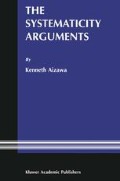Abstract
Chapters 3 through 6 examined the bearing of the systematicity and productivity arguments on cognitive architectures that were committed to Representationalism and the Computational Theory of the Attitudes. Chapter 7 extended this examination to two Connectionist models, models that were committed to Representationalism and at least not obviously inconsistent with the Computational Theory of the Attitudes. Chapter 8 extended the argument to two versions of Functionally Combinatorial theories of cognitive representations. Now, in this chapter, we shall consider an alternative cognitive architecture that part ways with both Representationalism and CTA, namely, an architecture based on Robert Cummins’s very interesting work on naturalizing meaning in Representations, Targets, and Attitudes. While Cummins believes that cognition involves computational processes and representations, he does not accept Representationalism or the Computational Theory of the Attitudes found in Classicism. Insofar as the many kinds of systematicity and productivity are bona fide features of human cognition, however, it is relevant to ask how this alternative cognitive architecture, designed to meet other explanatory ends, fares when facing the family of systematicity and productivity arguments.
Access this chapter
Tax calculation will be finalised at checkout
Purchases are for personal use only
Preview
Unable to display preview. Download preview PDF.
Notes
Cf., e.g., Dretske, (1981, 1988), Fodor, (1990).
The original formulation of the disjunction problem is to be found in Fodor, (1986). Fodor’s (1990) version for informational semantics suffers from a number of problems discussed in Adams & Aizawa, (1994).
Cf., Cummins, (1996a), p. 17.
Author information
Authors and Affiliations
Rights and permissions
Copyright information
© 2003 Springer Science+Business Media New York
About this chapter
Cite this chapter
Aizawa, K. (2003). An Alternative Cognitive Architecture. In: The Systematicity Arguments. Studies in Brain and Mind, vol 1. Springer, Boston, MA. https://doi.org/10.1007/978-1-4615-0275-3_9
Download citation
DOI: https://doi.org/10.1007/978-1-4615-0275-3_9
Publisher Name: Springer, Boston, MA
Print ISBN: 978-1-4020-7284-0
Online ISBN: 978-1-4615-0275-3
eBook Packages: Springer Book Archive

